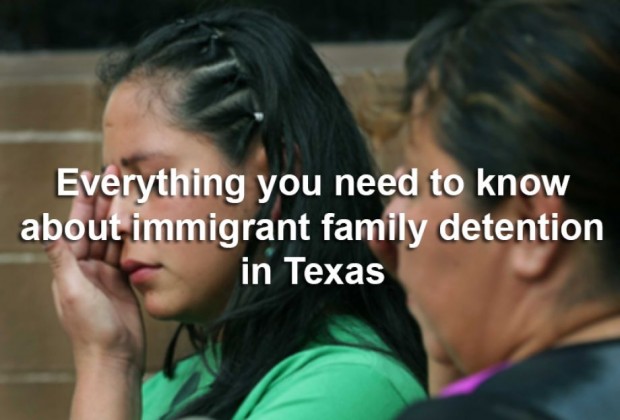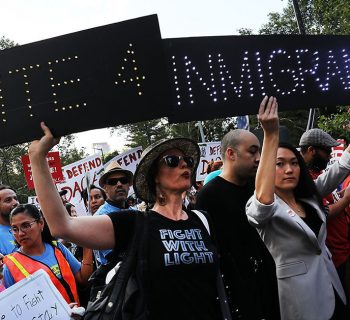Center for Human Rights and Constitutional Law
256 South Occidental Boulevard
Los Angeles, CA 90057
Telephone: (213) 388-8693
Facsimile: (213) 386-9484
www.centerforhumanrights.org
August 21, 2015
For immediate release
Federal Court Orders Release of Vast Majority of Detained Immigrant Children: accuses the Government of "fear-mongering."
Los Angeles. Today, federal court judge Dolly M. Gee in Los Angeles issued a lengthy order in a class action case entitled Flores v. Johnson requiring that the Department of Homeland Security end its lengthy detention immigrant children and their mothers in remote adult detention centers. A copy of the Court's decision may be downloaded at this link. A week ago, the Center for Human Rights and Constitutional Law, which represents all minors in the custody of DHS in a class action lawsuit, filed a large number of exhibits including 23 declarations from lawyers and statements of numerous members of Congress, faith leaders and child welfare experts decrying the detention policy initiated by DHS Secretary Jeh Johnson a year ago in response to a temporary surge in Central American mothers and children apprehended along the southern border. You can read our REPLY BRIEF, EXHIBITS and the COURT'S JULY 24 ORDER by selecting the links. The Court's July 24 Order fully explains the judge's reasoning. Extracts of the Court's final decision issued today are below.
All immigrant children detained by DHS are represented in a nationwide class action case by Carlos Holguin and Peter Schey of the Los Angeles-based Center for Human Rights and Constitutional Law.
Comment by Peter Schey, class counsel and President of the Center for Human Rights and Constitutional Law:
"The federal court's orders will protect refugee children and their mothers from lengthy and entirely senseless detention by the Department of Homeland Security in unsafe adult lock down facilities run by private corporations raking in millions of dollars in profits.
Secretary Jeh Johnson should be thoroughly ashamed of his 'anti-mother' detention policy that over the past year has caused thousands of detained innocent children to needlessly suffer severe psychological and often physical harm. We hope this ruling marks the end of brutal policy that has nothing to enhance border security."
Verbatim extracts from the Court's decision:
The Court starts its opinion with these words:
"An error does not become truth by reason of multiplied propagation, nor does truth become error because nobody sees it." -Mahatma Gandhi
Defendants fail to meet the standard for a reconsideration motion by, among other things, demonstrating the existence of new material facts or a change of law occurring after the time of the July 24, 2015 Order, the Court DENIES Defendants' motion for reconsideration. As such, the Court's July 24, 2015 Order stands, with some clarifications to the remedy. Defendants must implement the Court's remedies for their breach of the Agreement as set forth below by October 23, 2015.
As to material differences in fact, Defendants refer to the "May and June directives" issued by the DHS Secretary and ICE Director. Defendants' Resp. at 41. According to Defendants, these "directives" consist of "publicly announced policies fundamentally changing the character of family detention and the use of ICE's family residential centers." Id. at 18 (citing Homan Decl. ¶¶ 24-26 [Doc. # 184-1].) Specifically, on May 13, 2015, ICE announced it would implement a review process for any family detained beyond 90 days. Homan Decl. ¶ 25. Further, on June 24, 2015, the DHS announced that it would commit to evaluating claims for humanitarian relief "within a reasonable timeframe." Id. ¶ 26.
At most, these announcements show that Defendants may be less in breach than they were before.
More importantly, Defendants do not represent that the "new policies and practices" include the complete cessation of detention of accompanied minors in secure, unlicensed facilities.
As to material differences in the law, Defendants also fail to identify any that could not have been known at the time of the Court's July 24, 2015 Order with reasonable diligence. Defendants spill much ink discussing the Immigration and Nationality Act ("INA") provisions for expedited removal and reinstatement, but these laws existed well before the Court's July 24, 2015 Order. Indeed, they existed before the parties entered into their Agreement in 1997.
In fact, Defendants reiterate a number of arguments they raised in earlier briefing-which this Court rejected-including on the central issue of whether the consent decree applies to accompanied children. ... the Court has already found that the consent decree's language clearly and unambiguously applies to accompanied minors.
According to Defendants, the July 24, 2015 Order would "interfere with the Government's ability to place individuals into expedited removal at all" and "thwart Congress's clear intent to provide expedited removal, including detention, as a tool for DHS . . . ."
It may be the case that a minor's parent is in mandatory detention. In that situation, in order to effectuate the least restrictive form of detention for the child, Defendants must follow an order of preference for the minor's release to an available adult under Paragraph 14 of the Agreement. Under Paragraph 14, the order of preference begins with the parent, followed by a legal guardian, an adult relative (brother, sister, aunt, uncle, grandparent), an adult individual or entity designated by the parent or legal guardian, a licensed program willing to accept legal custody, and ending with an adult individual or entity seeking custody. Agreement ¶ 14.
A de minimis extension of the five-day requirement under individualized circumstances will not necessarily result in a breach of the Agreement or contravene the INA in all cases. The facts presented by Plaintiffs, however, show that prior to their motion to enforce, Defendants routinely failed to proceed as expeditiously as possible to place accompanied minors, and in some instances, may still be unnecessarily dragging their feet now.
Defendants state that "the proposed remedies could heighten the risk of another surge in illegal migration across our Southwest border by Central American families, including by incentivizing adults to bring children with them on their dangerous journey as a means to avoid detention and gain access to the interior of the United States." Defendants' Resp. at 12. This statement is speculative at best, and, at worse, fear-mongering.
Defendants have offered no credible reason why they cannot comply with the INA while simultaneously adhering to the Agreement's proscription against holding children for prolonged periods in secure, unlicensed facilities.
Border Patrol Stations Defendants contend that the Court's conclusion that they "have wholly failed to meet even [the] minimal standard" for "safe and sanitary" temporary holding cells-at Border Patrol stations-is "overbroad" and "ask that the Court reconsider it." ... the Court need not find that all Border Patrol stations are in breach of the Agreement before it can enforce standards set out in that Agreement. Thus, to the extent any Border Patrol station is out of compliance with the Agreement, those stations must comply with the Agreement and Defendants' own acknowledged standards and procedures. Accordingly, Defendants' request for an evidentiary hearing-made in part to have an "opportunity to cross examine any of the declarants . . . regarding their anecdotal claims"- is denied. ... None of Defendants' declarations challenged or contradicted the deplorable conditions Plaintiffs' declarants described, even if they pertained only to stations located in the Rio Grande Valley.
Conclusion & Orders:
The Court orders Secretary Johnson and DHS to implement the following remedies by no later than October 23, 2015:
- As required by Paragraph 18 of the Agreement, Defendants, upon taking an accompanied class member into custody, shall make and record prompt and continuous efforts toward family reunification and the release of the minorpursuant to Paragraph 14 of the Agreement.
- Unless otherwise required by the Agreement or the law, Defendants shall comply with Paragraph 14A of the Agreement by releasing class members without unnecessary delay in first order of preference to a parent, including a parent who either was apprehended with a class member or presented herself or himself with a class member.
Class members not released pursuant to Paragraph 14 of the Agreement will be processed in accordance with the Agreement, including, as applicable, Paragraphs 6, 9, 21, 22, and 23.
- Subject to Paragraph 12A of the Agreement, accompanied class members shall not be detained by Defendants in unlicensed or secure facilities that do not meet the requirements of Paragraph 6 of the Settlement or, in appropriate cases, as set forth in the Agreement, in facilities that do not meet the requirements of Paragraphs 12A, 21, and 23. Defendants shall not selectively apply the "influx" provision of Paragraph 12C of the Agreement to house class members apprehended with a parent in facilities that do not comply with the Agreement.
- To comply with Paragraph 14A of the Agreement and as contemplated in Paragraph 15, a class member's accompanying parent shall be released with the class member in accordance with applicable laws and regulations unless the parent is subject to mandatory detention under applicable law or after an individualized custody determination the parent is determined to pose a significant flight risk, or a threat to others or the national security, and the flight risk or threat cannot be mitigated by an appropriate bond or conditions of release.
- As contemplated in Paragraph 28A of the Agreement, Defendants or their Regional Juvenile Coordinator shall monitor compliance with their acknowledged standards and procedures for detaining class members in facilities that are safe and sanitary, consistent with concern for the particular vulnerability of minors, and consistent with Paragraph 12 of the Agreement, including access to adequate drinking water and food, toilets and sinks, medical assistance if the minor is in need of emergency services, temperature control, ventilation, adequate supervision to protect minors from others, and contact with family members who were arrested with the minor.In the alternative, the parties may stipulate to the appointment of a special monitor for this purpose.
- Defendants shall monitor compliance with the Agreement and this Order and shall provide Class Counsel on a monthly basis statistical information collected pursuant to Paragraph 28A of the Agreement.
IT IS SO ORDERED. DATED: August 21, 2015
DOLLY M. GEE UNITED STATES DISTRICT JUDGE
Peter A. Schey
323-251-3223







